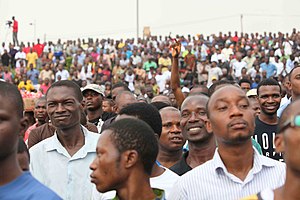Occupy Nigeria
| Occupy Nigeria |
|
|---|---|
 |
|
| Date | 2 January 2012 – 14 January 2012 (1 week and 5 days) |
| Location | Nigeria and Nigerian diaspora. |
| Caused by |
|
| Goals |
|
| Methods | |
| Casualties | |
| Death(s) | 16 (Lagos, Maiduguri, Ilorin and Gusau; All shot by the Nigeria Police Force) |
Occupy Nigeria was a socio-political protest movement that began in Nigeria on Monday, 2 January 2012 in response to the fuel subsidy removal by the Federal Government of President Goodluck Jonathan on Sunday, 1 January 2012. Protests took place across the country, including in the cities of Kano, Ojota ( -part of metropolitan Lagos ), Abuja, and at the Nigerian High Commission in London. The protests have been characterised by civil disobedience, civil resistance, strike actions, demonstrations and online activism. The use of social media services such as Twitter and Facebook has been a prominent feature.
Through 2012, Occupy Nigeria continued to engage in organized meetings, events and actions.
Nigeria is Africa's largest oil producer, but still imports refined petrol. The country produces about 2.4 million barrels of crude oil daily which is exported to be refined abroad; however due to years of corruption-fueled neglect the domestic refineries are inoperative. As a consequence, Nigeria imports 70% of its gasoline (about 250,000bpd of petroleum products) into the country for sale to its citizens. The price of petrol has increased from 65 naira ($0.40; £0.26) per litre to at least 141 naira in filling stations and from 100 naira to at least 200 naira on the black market, from which many Nigerians buy their fuel.
With the majority of Nigerians living on less than $2 per day, cheap petrol is viewed by many Nigerians as the only tangible benefit they receive from the state, hence the widespread disapproval. In addition, the economy is heavily reliant on crude oil (amongst other reasons,due to absence of essential infrastructure and services such as constant electricity). A consequence of this is that other seemingly unrelated items are tied to the price of fuel as has occurred from previous price hikes. Due to the absence of stable electricity, gasoline generators are a common energy alternative for small businesses and residences.
...
Wikipedia
